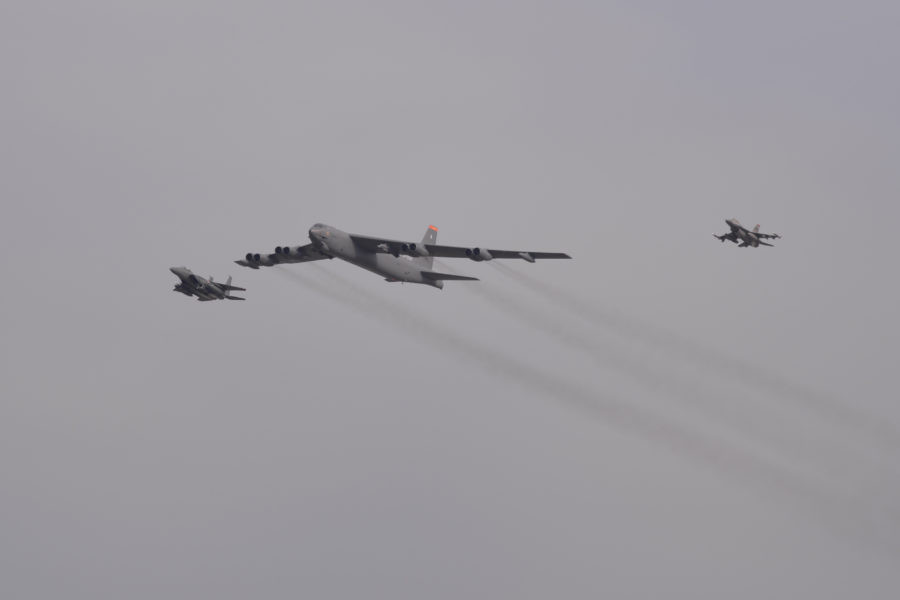The U.S. promised to deepen consultations with South Korea on a possible American nuclear response to a North Korean attack. In exchange, South Korea reaffirmed that it will not develop its own nuclear arsenal.
The understanding is outlined in a new agreement, dubbed the “Washington Declaration,” which was released April 26 during South Korean President Yoon Suk Yeol’s state visit to Washington.
The aim of the accord is to strengthen the U.S.’s commitment to its “extended deterrence” mission—in which America vows to defend South Korea from attack with the full range of its military capabilities, including nuclear weapons.
“Our mutual defense treaty is ironclad,” President Joe Biden said during a press conference with Yoon at the White House. “That includes the nuclear threat and the nuclear deterrent.”
To drive the point home, the U.S. plans to make high-profile, but temporary, deployments, of nuclear-capable systems to the Korean peninsula, such as B-52 bombers and nuclear missile submarines.
“Going forward, the United States will further enhance the regular visibility of strategic assets to the Korean Peninsula, as evidenced by the upcoming visit of a U.S. nuclear ballistic missile submarine to the ROK,” the document says, referring to the Republic of Korea.
That would be the first strategic submarine port call since the USS Robert E. Lee deployed to South Korea in 1981.
North Korea—officially the Democratic People’s Republic of Korea, or DRPK—launched a record number of missiles in 2022. The country’s totalitarian leader, Kim Jong Un, has embarked on an ambitious ballistic missile and nuclear modernization effort, stoking fears in South Korea, which does not have a nuclear arsenal of its own.
To reassure Seoul, the agreement will establish a new Nuclear Consultative Group in which senior officials from both countries will regularly meet. The officials will not discuss targeting but will have broader deliberations to “strengthen extended deterrence, discuss nuclear and strategic planning, and manage the threat” posed by North Korea, the Washington Declaration states.
Those deliberations are expected to lead to more exercises in which South Korea’s conventional forces are paired with U.S. nuclear-capable systems.
“The Alliance will work to enable joint execution and planning for ROK conventional support to U.S. nuclear operations in a contingency and improve combined exercises and training activities on the application of nuclear deterrence,” the declaration says.
The U.S. already has arrangements for conventionally armed countries to support America’s nuclear forces, such as NATO’s Support of Nuclear Operations With Conventional Air Tactics (SNOWCAT), which has seen fighters from non-nuclear European nations exercise with American nuclear-capable aircraft.
Yoon said South Korea’s “state-of-the-art conventional forces” would be paired with American nuclear assets in planning and drills. “Sustainable peace on the Korean Peninsula does not happen automatically,” he said, adding that deterring North Korea required “superiority of overwhelming forces and not a false peace based on the goodwill of the other side.”
The declaration also noted that a new South Korean Strategic Command, which will oversee the nation’s missiles and other key assets, will be linked to the joint U.S.-South Korean command on the peninsula.
Public opinion polls in South Korea show upwards of 70 percent of the population supports the indigenous production of nuclear arms, a prospect Yoon publicly floated in January.
“What the South Koreans want is a voice on this,” Robert Einhorn, a former senior State Department official now at the Brookings Institution, told Air & Space Forces Magazine. “They want to be able to weigh in on this crucial decision, and this Washington Declaration will assure them that they will have that voice.”
Some nuclear policy experts said it was too soon to say how deep the increased coordination would be, but the agreement was also a symbolic effort by Washington to reassure Seoul.
“The big picture is the Biden administration has acknowledged that it was necessary for it to do more,” said Hans Kristensen of the Federation of American Scientists.

